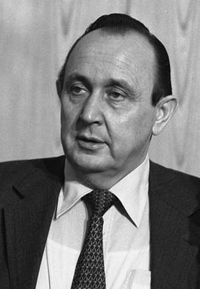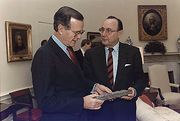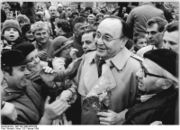Hans-Dietrich Genscher
| Hans-Dietrich Genscher | |
 Hans-Dietrich Genscher, 1978 |
|
|
Foreign Minister of Germany
|
|
| In office May 17, 1974 – 17 September 1982 |
|
| Preceded by | Walter Scheel |
|---|---|
| Succeeded by | Helmut Schmidt (acting) |
| In office 1 October 1982 – May 17, 1992 |
|
| Preceded by | Helmut Schmidt (acting) |
| Succeeded by | Klaus Kinkel |
|
Minister of the Interior of Germany
|
|
| In office October 22, 1969 – May 16, 1974 |
|
| Preceded by | Ernst Benda |
| Succeeded by | Werner Maihofer |
|
|
|
| Born | March 21, 1927 Reideburg, Germany |
| Political party | Free Democratic Party of Germany (1952–present) |
| Other political affiliations |
Nazi Party (1945)
Liberal Democratic Party of Germany (GDR) (1946-52) |
| Spouse(s) | Barbara Schmidt Genscher |
| Occupation | Politician |


Hans-Dietrich Genscher (born March 21, 1927) is a German politician of the liberal Free Democratic Party (FDP). He served as Foreign Minister and Vice Chancellor of Germany from 1974 to 1982 and, after a two-week pause, from 1982 to 1992, making him Germany's longest serving Foreign Minister and Vice Chancellor. In 1991, he was Chairman of the OSCE.
Contents |
Biography
Early life
Genscher was born at Reideburg (Province of Saxony), now a part of Halle, in what later became East Germany. He joined the Hitler Youth, which was obligatory to all German youth from 1936 on, and was drafted to serve as a member of the Air Force Support Personnel (Luftwaffenhelfer) at the age of 16. In 1945 he also became a member of the Nazi Party. According to Genscher's statements, this happened through a collective application in his Wehrmacht unit and against his own intentions.
Genscher fought as a young man in the Wehrmacht at the end of the Second World War. In 1945, Genscher was a young soldier in General Walther Wenck's 12th Army. He participated in Wenck's link up with the remnants of Colonel General (Generaloberst) Theodor Busse's 9th Army. Together, they marched what was left of both armies, along with many civilians, to the American lines and surrendered. For this reason, Genscher briefly became an American and British prisoner of war. After World War II, he studied law and economics at the universities of Halle and Leipzig (1946-1949) and joined the East German Liberal Democratic Party (LDPD) in 1946.
Political career
In 1952, Genscher fled to West Germany, where he joined the Free Democratic Party (FDP). He passed his second state examination in law in Hamburg in 1954 and became a solicitor in Bremen.
In 1965 Genscher was elected on the North Rhine-Westphalian FDP list to the West German parliament and remained a member of parliament until his retirement in 1998. After serving in several party offices, he was appointed Minister of the Interior by Chancellor Willy Brandt, whose Social Democratic Party was in coalition with the FDP, in 1969; in 1974, he became foreign minister and Vice Chancellor.
In 1972, while Minister for the Interior, he rejected Israel’s offer to send an Israeli special forces unit to Germany to deal with the Black September hijacking of the 1972 Summer Olympics. The crisis ended in a bloody shootout at Fürstenfeldbruck Air Base which left 11 hostages, 5 terrorists, and 1 German policeman dead. Genscher's popularity with Israel declined further when he endorsed the handing over of the three captured hijackers to the Palestinians following the hijacking of a Lufthansa plane on October 29, 1972.
In the SPD-FDP coalition, he helped shape Brandt's policy of deescalation with the communist East, commonly known as Ostpolitik, which was continued under Helmut Schmidt after Brandt's resignation in 1974.
Still, Genscher was one of the FDP's driving forces when, in 1982, the party switched sides from its coalition with the SPD to support the CDU/CSU in their Constructive Vote of No Confidence to have Helmut Schmidt replaced with Helmut Kohl as Chancellor. Despite the great controversy that accompanied this switch, he remained one of the most popular politicians in West Germany. He retained his posts as foreign minister and vice chancellor through German reunification and until 1992, when he stepped down for health reasons.
Reunification efforts
He is mostly respected for his efforts that helped spell the end the Cold War, and which led to German reunification, when Communist eastern European governments toppled in the late 1980s; for example, he visited Poland to meet Lech Wałęsa as early as 1988. In 1988, he was awarded the Prize For Freedom of the Liberal International. One event remembered by many is his September 30, 1989 speech from the balcony of the German embassy in Prague, in whose courtyard thousands of East German citizens had assembled to flee to the West, when he announced that he had reached an agreement with the Communist Czechoslovakian government that the refugees could leave: "We have come to you to tell you that today, your departure ..." (German: "Wir sind zu Ihnen gekommen, um Ihnen mitzuteilen, daß heute Ihre Ausreise ..."). After these words, the speech drowned in cheers.[1]
In 1991, Genscher raced to recognize the Republic of Croatia in the Croatian War of Independence shortly after the Serbian attack on Vukovar. The rest of the European Union was pressured to follow suit soon afterward. Historically Germany has had a close collaboration with Croatia. Germany was active in putting together the coalition against Slobodan Milošević.
Genscher was also an active participant in the further development of the European Union, taking active part in the Single European Act Treaty negotiations in the mid 1980s, as well as the joint publication of the Genscher-Colombo plan with Italian Minister of Foreign Affairs Emilio Colombo which advocated further integration and deepening of relations in the European Union towards a more federalist European State.
Career after politics
Having finished his political career Genscher has been active as a lawyer and in international relations organizations. He founded his own Hans-Dietrich Genscher Consult GmbH in 2000. In 2009. he expressed public concern at the lifting of the bishops of the Society of Saint Pius X. Genscher wrote in the Mitteldeutsche Zeitung: Poles can be proud of Pope John Paul II. At the last papal election, we said We are the pope! But please—not like this.[2] He argued that Pope Benedict XVI is making a habit of offending non-Catholics. This is a deep moral and political question. It is about respect for the victims of crimes against humanity, Genscher said.[3]
See also
References
| Political offices | ||
|---|---|---|
| Preceded by Ernst Benda |
German Minister of the Interior 1969–1974 |
Succeeded by Werner Maihofer |
| Preceded by Walter Scheel |
Foreign Minister of Germany 1974–1982 |
Succeeded by Helmut Schmidt (acting) |
| Preceded by Helmut Schmidt (acting) |
Foreign Minister of Germany 1982–1992 |
Succeeded by Klaus Kinkel |
| Preceded by Walter Scheel |
Vice Chancellor of Germany 1974–1982 |
Succeeded by Egon Franke |
| Preceded by Egon Franke |
Vice Chancellor of Germany 1982–1992 |
Succeeded by Jürgen Wilhelm Möllemann |
| Diplomatic posts | ||
| Preceded by - |
Chairman-in-Office of the OSCE 1991 |
Succeeded by Jiří Dienstbier Czechoslovakia |
|
|||||||||||||||||
|
|||||||||||||||||
|
|||||